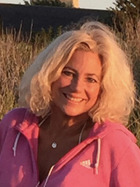
In the last year, Greta, 57, endured debilitating symptoms. She was constantly experiencing flushing, redness and warmth around the face and neck, and had chronic abdominal/bowel/digestive issues and weight gain. Initially seen and diagnosed by her gastro endocrine doctor, she was told her symptoms were caused by the onset of menopause and that she merely had irritable bowel syndrome, diviriculitus and divirticulosis When these symptoms continued and became elevated with more severity and intensity, a few more diagnoses were thrown into the mix, like ulcerative colitis, cecum thickening and H. Pylori,. Greta knew something still wasn’t right and pressed for even more tests, questioned the outcome of these tests, which were not read and deciphered properly and her symptoms began to progress further. She constantly complained of extreme and frequent abdominal dissension, excessive diarrhea, nausea and vomiting.
Before Greta had her gall bladder, appendix removed and abdominal exploratory surgery was performed In September, 2015, Greta suspected cancer ‘somewhere’ but none was to be found, and after demanding a colonoscopy (which she was told she did not need one until another 4 years), her colon was scoped and revealed “no cancer”, so Greta thought she was in the clear. However, that was not the case and her gastro endocrine doctor missed her tumor completely, did not scope high enough and so the Primary Tumor continued to grow. A few days later, Greta got the devastating news that she did in fact have cancer called carcinoid cancer, a type of neuroendocrine tumor that is so rare, her own doctor was caught by surprise.. After a series of nuclear scans, MRIs and cat scans were performed to find the primary tumor that was missed in the colonoscopy, it was found. Surgery was scheduled for October 23rd, but on October 12, 2015, Greta was rushed to the hospital with a bowel obstruction – the tumor tripled in size which blocked her bowel and small intestine and caused a severe life threatening situation. 12 days later and sitting with her oncologist, Greta was shocked to hear that the cancer now spread and metastasized throughout various organs and parts of her body. Greta is now battling this cancer as a terminal cancer patient, seeking treatment and advice from doctors all over the country and the world that deal with this rare, incurable cancer which is very complicated, often misdiagnosed and by the time it is finally diagnosed, the prognosis is grim. Greta is in stage 4 (last stage) and fully metastasized and will never be in remission. There is no cure at this time.
After her world was turned upside down by her diagnosis, Greta turned to family and friends for love and support. Close friends and family took turns attending doctor appointments with Greta so she didn’t have to go alone.
Greta has also found that her three dogs provide a constant source of comfort, especially her special Harley. Harley and Greta first met shortly after Greta started treatment. “Harley is the one that her out of bed every day. Sometimes he’ll nuzzle up against me in the morning and nudge me as if to say…get up, let’s go”, says Greta, providing the gentle encouragement and all important physical activity she needs to start her day. Her 2 pugs, Elvis and Andy are constant companions as well.
Since her diagnosis, Greta has become a dedicated patient advocate/activist and is raising awareness of Neuroendocrine Tumor and Carcinoid Cancer. Because of the complexity and rareness of Greta’s cancer, she stresses the importance of getting a second, third and even 4th opinions and the significance of the getting the best care possible, wherever that may be, out of state or abroad and understanding and knowing your cancer and asking a lot of questions – if you don’t know what you don’t know, how will you know? Empower yourself with knowledge and information.
“I want to live as full of a life as I can everyday and wish to inspire, educate, motivate and help people take charge of their health. I want to do as much as I can and make my life and cancer journey count for something. I will not allow cancer to define me nor bring me down (or others around me). I will not live a long healthy life as I had planned. My goal is to not have others suffer as I am and ultimately my efforts will hopefully save lives or extend time for those afflicted, along the way.”
